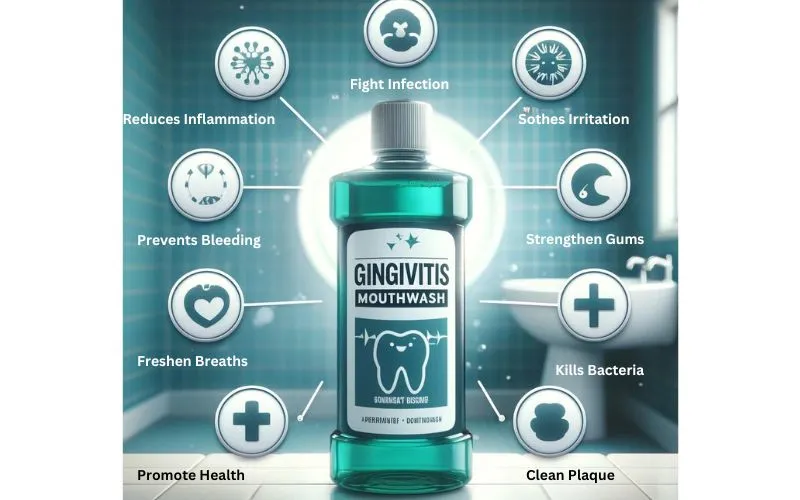Gingivitis is a common and mild form of gum disease that manifests as irritation, redness, and swelling of the gingiva, the part of the gum around the base of teeth. If left untreated, it can progress to more severe periodontal disease, leading to tooth loss and other complications. Understanding gingivitis’s early signs and symptoms is crucial for maintaining optimal oral health.
The Role of Mouthwash in Oral Hygiene
Mouthwash is a supplementary tool in daily oral hygiene routines, alongside brushing and flossing. It helps to reduce the number of harmful bacteria in the mouth, minimizing the risk of dental plaque buildup. For individuals with gingivitis, using a specialized mouthwash can be particularly beneficial in managing and reducing symptoms. Antimicrobial and antiseptic properties of certain mouthwashes can significantly lower the presence of pathogens contributing to gum inflammation.
Mouthwash can reach areas that brushing and flossing might miss, such as the back of the throat and deep between the teeth and gums. This comprehensive coverage ensures a cleaner oral environment and fresher breath. Mouthwash also provides a quick and convenient solution for maintaining oral hygiene throughout the day, especially when brushing isn’t feasible.
Key Ingredients in Gingivitis Mouthwash
Effective gingivitis mouthwashes contain specific ingredients that target the causes and symptoms of gum disease.
- Chlorhexidine, a powerful antiseptic, is commonly used due to its ability to kill bacteria and reduce inflammation.
- Essential oils, such as eucalyptol, menthol, and thymol, also play a crucial role in combating gingivitis.
- Additionally, mouthwashes may include fluoride to strengthen enamel and prevent cavities and antimicrobial agents like cetylpyridinium chloride to reduce bacterial presence further.
- Some mouthwashes also contain aloe vera and hydrogen peroxide to soothe the gums and provide a gentle cleansing action.
By combining these potent ingredients, gingivitis mouthwashes offer a multifaceted approach to oral care, addressing both the immediate symptoms and the underlying causes of gum inflammation. Regular use of such mouthwashes can lead to significant improvements in gum health and overall oral hygiene.
Benefits of Using Gingivitis Mouthwash
The regular use of gingivitis mouthwash offers numerous advantages.

- It helps control the growth of harmful bacteria, thereby reducing plaque and tartar buildup. This, in turn, leads to healthier gums and a reduction in gingivitis symptoms such as swelling, bleeding, and irritation. Furthermore, the freshening effect of mouthwash enhances oral cleanliness and breath, providing a sense of well-being and confidence.
- Gingivitis mouthwash targets the visible signs of gum disease and addresses the underlying bacterial causes. Its antibacterial properties help maintain a balanced oral microbiome, which is crucial for overall dental health. By reducing the bacterial load, mouthwash minimizes the risk of bacteria spreading to other parts of the oral cavity, potentially preventing more severe oral health issues.
- Moreover, certain mouthwashes contain anti-inflammatory agents that soothe irritated gums, relieving discomfort. This can be particularly beneficial for individuals who experience pain or sensitivity due to gingivitis.
- Regular use of mouthwash also complements brushing and flossing, reaching areas that might be missed by these methods alone, such as deep pockets between the teeth and gums.
In addition to its therapeutic benefits, gingivitis mouthwash can enhance the effectiveness of other dental treatments. For instance, when used in conjunction with professional cleanings and periodontal treatments, mouthwash can help maintain the gums’ health and prevent gum disease recurrence. It can also support the healing process after dental procedures by keeping the mouth clean and reducing the risk of infection.
Recommended Mouthwashes for Gingivitis
Choosing the right mouthwash can significantly enhance your oral hygiene routine, especially when dealing with gingivitis. Here are some highly recommended mouthwashes that effectively target gum disease and promote overall oral health:
Listerine Total Care Anticavity Mouthwash
- Key Ingredients: Contains essential oils such as eucalyptol, menthol, and thymol, as well as fluoride for cavity protection.
- Benefits: This mouthwash provides comprehensive oral care by fighting cavities, strengthening teeth, and reducing plaque. Its essential oils help reduce gum inflammation and freshen your breath.

Crest Pro-Health Multi-Protection Mouthwash
- Key Ingredients: Cetylpyridinium chloride, fluoride, and other antimicrobial agents.
- Benefits: Known for its ability to fight plaque and gingivitis, this mouthwash also helps prevent cavities and freshens breath without the burn of alcohol. It targets bacteria that cause gum disease and bad breath.

Colgate Peroxyl Mouth Sore Rinse
- Key Ingredients: Hydrogen peroxide and cetylpyridinium chloride.
- Benefits: This mouthwash is particularly effective for those with gingivitis and mouth sores. It helps cleanse minor oral wounds and gum irritations, providing a soothing effect while reducing bacterial presence.

TheraBreath Healthy Gums Oral Rinse
- Key Ingredients: Cetylpyridinium chloride and aloe vera.
- Benefits: Formulated by dentists, TheraBreath is alcohol-free and targets bacteria responsible for gingivitis. Aloe vera provides soothing relief for irritated gums, making it a gentle yet effective option for managing gum health.

ACT Total Care Anticavity Fluoride Mouthwash
- Key Ingredients: Fluoride and essential oils.
- Benefits: This mouthwash not only strengthens teeth with fluoride but also fights plaque and gingivitis with its essential oils. It helps maintain healthy gums while protecting against cavities and freshening breath.

These mouthwashes are highly recommended for their effectiveness in managing and preventing gingivitis, ensuring overall oral health is maintained. Always consult with a dentist to choose the best product for your specific needs.
Proper Usage and Best Practices
It is essential to use gingivitis mouthwash correctly to maximize its efficacy.
Swish the mouthwash in your mouth for the recommended duration, usually around 30 seconds, ensuring it reaches all areas, especially the gum line. Avoid eating or drinking for at least 30 minutes after using mouthwash to allow the active ingredients to work effectively. Incorporate mouthwash into your daily oral hygiene routine, using it once or twice daily as directed by your dental professional.
It’s important to note that while mouthwash is a valuable addition to oral hygiene, it should not replace brushing and flossing. Rather, it should be used as a supplementary measure to enhance oral care. When choosing a mouthwash, look for products specifically formulated for gingivitis, as they contain the necessary ingredients to target this condition.
Consistency is key when using gingivitis mouthwash. Make it a habit to use mouthwash at the same times each day to ensure you remember. Keeping the mouthwash in a visible and accessible location, such as near your toothbrush, can be a helpful reminder. Additionally, following the recommended dosage is crucial; too much or too little can affect its effectiveness.
- For individuals with sensitive gums or allergies, starting with a smaller mouthwash is advisable, and the usage should gradually increase as tolerated. Always read the product label and follow the instructions provided by the manufacturer. If any adverse reactions occur, discontinue use and consult your dentist.
- Maintaining a healthy diet and lifestyle can enhance the benefits of using gingivitis mouthwash. A diet rich in vitamins and minerals, particularly vitamin C and calcium, supports gum health. Avoiding tobacco products and reducing sugar intake can also help prevent gum disease.
- Regular dental check-ups are essential for monitoring gum health and ensuring that gingivitis mouthwash effectively contributes to your oral hygiene routine. Your dentist can provide personalized advice and recommend specific products based on your individual needs.
By incorporating these best practices and maintaining a consistent oral care routine, you can optimize the benefits of gingivitis mouthwash and achieve healthier gums and teeth.
Potential Side Effects and Considerations
While gingivitis mouthwash is generally safe, some individuals may experience side effects. Here are some key points to consider:
- Temporary Alteration in Taste: Some users may notice a temporary change in their sense of taste after using the mouthwash. This effect usually subsides shortly after use.
- Staining of Teeth: Certain ingredients in gingivitis mouthwash, such as chlorhexidine, can stain teeth. Regular brushing and dental cleanings can help manage this issue.
- Interaction with Medications: It’s essential to consult with a dentist or healthcare provider before starting a new mouthwash, especially if you are taking other medications that might interact with the ingredients.
- Underlying Health Conditions: Individuals with certain health conditions, such as diabetes or immune disorders, should seek professional advice to ensure the mouthwash is safe.
- Pregnancy and Nursing: Pregnant or nursing women should consult their healthcare provider before using gingivitis mouthwash to ensure it is safe for them and their babies.
- Proper Selection: Choosing a mouthwash that suits your needs and following professional advice can help mitigate potential risks. Look for products with ADA (American Dental Association) approval or other credible endorsements.
By being aware of these potential side effects and considerations, individuals can make informed decisions about incorporating gingivitis mouthwash into their oral hygiene routine.
Conclusion
Gingivitis mouthwash is a powerful adjunct to traditional oral hygiene practices, offering significant benefits in controlling harmful bacteria, reducing plaque buildup, and alleviating symptoms associated with gum disease. By understanding the key ingredients, proper usage, and potential side effects, individuals can effectively integrate mouthwash into their daily routines to enhance their oral health.
While gingivitis mouthwash can greatly contribute to maintaining healthy gums, it is essential to use it cautiously. Consulting with a dental professional ensures that the chosen product aligns with personal health needs and conditions, optimizing the mouthwash’s efficacy and minimizing risks.

Dr. Orion Johnson is a dedicated and compassionate dentist committed to providing exceptional dental care to his patients.Dr. Johnson obtained his Doctor of Dental Surgery (DDS) degree from a prestigious dental school, where he excelled academically and clinically. He is licensed to practice dentistry and stays updated with the technology through continuing education and training.
